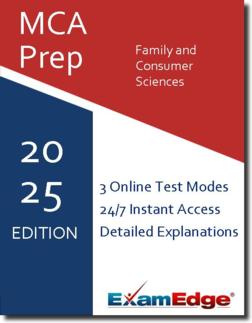MCA Family and Consumer Sciences (038) Practice Tests & Test Prep by Exam Edge - Topics
Based on 28 Reviews
- Real Exam Simulation: Timed questions and matching content build comfort for your MCA Family and Consumer Sciences test day.
- Instant, 24/7 Access: Web-based MCA Family and Consumer Sciences practice exams with no software needed.
- Clear Explanations: Step-by-step answers and explanations for your MCA exam to strengthen understanding.
- Boosted Confidence: Reduces anxiety and improves test-taking skills to ace your MCA Family and Consumer Sciences (038).

Understanding the exact breakdown of the MCA Family and Consumer Sciences test will help you know what to expect and how to most effectively prepare. The MCA Family and Consumer Sciences has 100 multiple-choice questions The exam will be broken down into the sections below:
| MCA Family and Consumer Sciences Exam Blueprint | ||
|---|---|---|
| Domain Name | % | Number of Questions |
| Human Development and Relationships | 33% | 33 |
| Resource Management and Consumer Skills | 25% | 25 |
| Nutrition and Foods | 25% | 25 |
| Workplace Skills and Careers | 17% | 17 |


